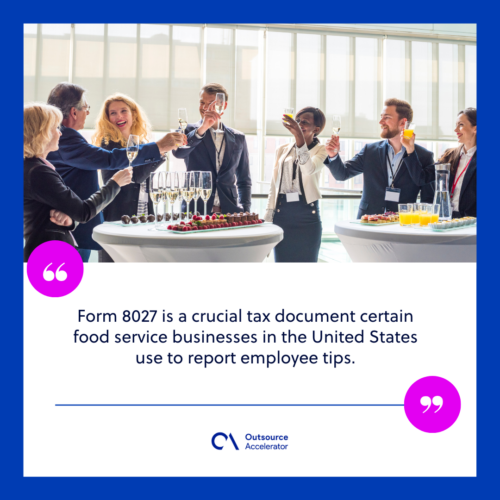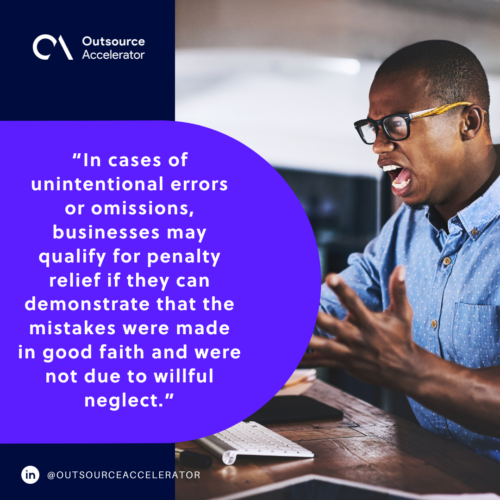A quick guide to IRS Form 8027

Are you a restaurant owner looking to understand your reporting obligations for tip income?
IRS Form 8027, often an overlooked form, is crucial to businesses in the hospitality industry. It’s designed to ensure accurate reporting and fair taxation.
As an integral component of the IRS’s efforts to maintain transparency and equity in income reporting, understanding Form 8027 carries heavy implications.
In this article, we will guide you through the ins and outs of Form 8027, breaking down its purpose, who needs to file it, and what information you need to provide.
What is IRS Form 8027?
Form 8027 is a crucial tax document certain food service businesses in the United States use to report employee tips. The form is officially titled “Employer’s Annual Information Return of Tip Income and Allocated Tips.”
Form 8027’s primary purpose is to facilitate accurate tip income reporting by employers. This reporting ensures that the correct amount of taxes has been withheld from the employees’ paychecks.
The form requires employers to provide details about total tips and allocated tips, which are those distributed by the employer to the employees through different methods.
Reporting is not required if the tips do not exceed $20 in a single month.
By filing Form 8027, businesses comply with their reporting obligations and assist the IRS in monitoring and tracking tip income within the industry.

Who needs to file Form 8027?
Form 8027 is typically required to be filed by employers in the United States who operate businesses where tipping is common. This covers those in the hospitality industry, like restaurants and bars.
According to IRS guidelines, a food or beverage establishment that meets the following criteria must file Form 8027:
- Located in the 50 states or the District of Columbia
- Employs food and beverage workers who commonly receive tips from customers
- Employs at least ten employees on a regular business day
If these requirements are met, the establishment must:
- Annually report receipts and tips from its large establishment
- Allocate tips based on performance
- Compute the employer’s tax share
The IRS uses the reports to ensure that employers and employees have paid all the appropriate taxes on tips.
How to fill out Form 8027
Filling out IRS Form 8027 involves providing detailed information about the tipped income in your establishment.
To assist you with the procedure, below is a step-by-step guide:
1. Identification – Enter your business’s legal name, address, and Employer Identification Number (EIN).
2. Basic information – Provide the total number of employees who received tips during the relevant period.
3. Gross receipts – Report the total gross receipts. This includes both cash and charged receipts.
4. Reportable tip income – Report the number of employees who received tips directly, the total charged tips, and the total cash tips.
5. Allocated tips – Allocated tips are the employer’s share of tips distributed to employees through a tip-sharing or tip-pooling arrangement. Report these as well.

6. Summary – Calculate the combined total of direct and allocated tips.
7. Comparison with credit card tips – If your employees report their tips through credit card transactions, compare the total tips reported with credit card sales. Report any discrepancies.
8. Signature and certification – Sign and date Form 8027.
9. Submission – File Form 8027 by the due date.
10. Retain records – Keep accurate records of all the information reported on the form. Retain these for at least the next four years.
Remember to review all the instructions and guidelines provided by the IRS when filling out Form 8027. Businesses may also seek the assistance of tax professionals and accountants to ensure accurate and timely filing.
When is Form 8027 due to the IRS?
Form 8027 is generally due by the last day of February following the calendar year being reported.
For example, if you’re reporting information for the calendar year of 2023, the deadline for filing would be February 29, 2024 (which is a leap year).
If you file electronically, the due date may be extended to March 31.
The due dates may vary, so it’s important to check the specific instructions and guidelines provided by the IRS for the year you’re filing.
Businesses must adhere to this deadline to ensure timely and accurate tip income reporting. Additionally, businesses are encouraged to keep copies of the filed form and related records for a minimum of four years in case of future inquiries or IRS audits.
Penalties for misfiling Form 8027
Failure to accurately and timely file Form 8027 can result in penalties imposed by the IRS. The specific penalties depend on the nature and extent of the errors or omissions in the filing.
Here are some potential penalties associated with misfiling the form:
- Failure to file penalty – This is given when a business fails to file by the due date. The penalty is typically calculated based on the time elapsed from the due date until the form is eventually filed.
- Inaccuracy or underreporting penalty – This is given for the understatement of taxes. The penalty is typically a percentage of the underreported amount.
- Intentional disregard penalty – The misfiling may be due to intentional disregard of the reporting requirements. In this case, the IRS may impose a penalty that is a percentage of the total unreported tip income.
- Negligence or disregard of rules penalty – Penalties may be assessed if the misfiling is a result of negligence or a disregard of the IRS rules and guidelines.
Businesses must make every effort to accurately complete and file Form 8027 by the specified deadline to avoid these penalties.
In cases of unintentional errors or omissions, businesses may qualify for penalty relief if they can demonstrate that the mistakes were made in good faith and were not due to willful neglect.

To fully understand the potential penalties for misfiling Form 8027, it’s advisable to consult the official IRS guidelines and instructions.
Additionally, seeking assistance from a tax professional or advisor can provide valuable guidance on possible ramifications.







 Independent
Independent




